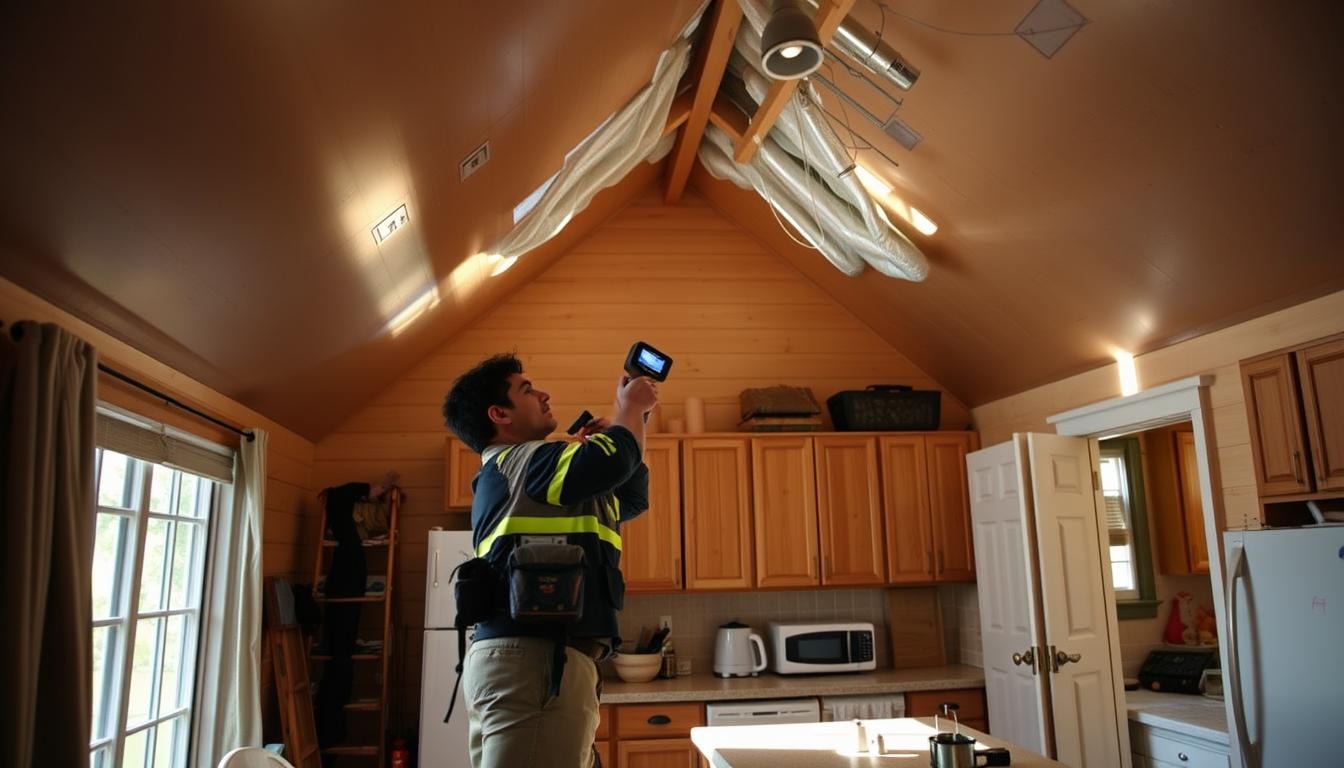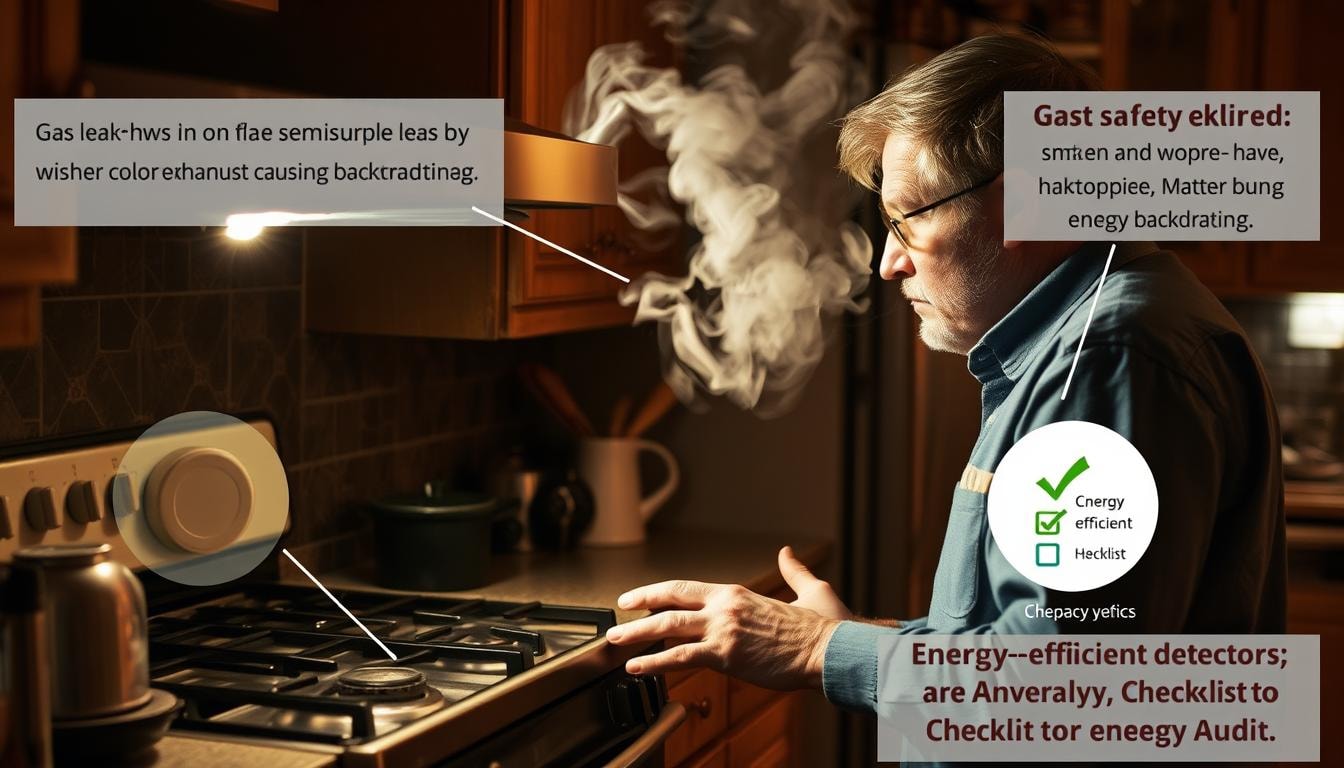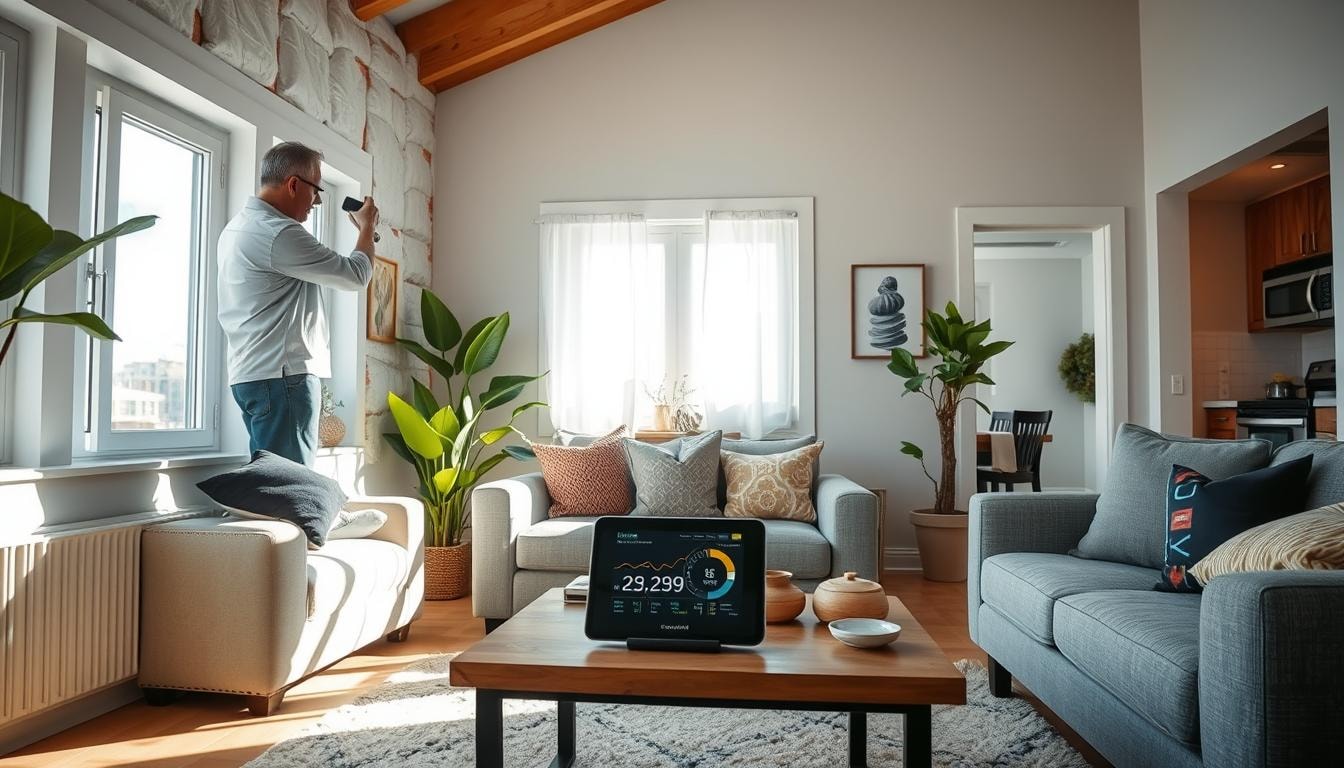Home Energy Audit Near You
Can’t find what you are looking for?
How It Works
-
Answer a few questions about your home project.
-
Within seconds, get matched with top-rated local pros.
-
Compare quotes and choose the best pro for the job.
Home Energy Audit In Your Area
Need a Home Energy Audit? Here’s What to Expect
Meta Description: Discover how a home energy audit can boost efficiency and save you money. Learn what to expect and how to prepare for this valuable assessment.

A professional home energy audit can help you save on utility bills. It’s a great way to improve your home’s comfort and efficiency. Let’s explore what happens during this assessment.
Key Takeaways
-
01
A home energy audit can identify energy waste and improve efficiency. It may reduce energy use by 15-30%.
-
02
The audit takes 2-3 hours. It analyzes energy use, appliances, bills, and includes tests like blower door testing.
-
03
Homeowners can get up to $150 in tax credits for an energy audit. This is through the Energy Efficient Home Improvement Tax Credit (25C).
-
04
Following audit recommendations can lead to big savings. These may include air sealing, insulation upgrades, and high-efficiency appliances.
-
05
A well-sealed home is safer during extreme weather. It enhances your living space’s overall resilience and comfort.
What is a Home Energy Audit?
A home energy audit checks how well your house uses energy. A professional examines your home to find where energy is wasted. They aim to improve efficiency, lower bills, and boost comfort.
- Understanding Building Science: Home energy auditors know building science well. They study how different parts of a house work together. This knowledge helps them spot energy waste in your home. Auditors look at structure, insulation, and HVAC systems. They see how these affect energy use and indoor comfort. This helps them find areas losing energy.
- Assessing Energy Efficiency: The auditor checks your home’s overall energy efficiency. They look at insulation, air leaks, and how well your HVAC system works. Special tools like infrared cameras help find problem areas. After the assessment, you’ll get a detailed report. It will suggest ways to make your home more energy-efficient.
An energy audit helps you save money and feel more comfortable. It shows you where to improve your home. You can make smart choices about upgrades with this information.
The Appliances Assessment
A professional home energy auditor starts by inspecting your appliances. They evaluate the age, condition, and efficiency of your major energy-consuming devices. This includes furnaces, air conditioners, water heaters, and other household appliances.
The auditor aims to understand your home’s energy usage distribution. They identify problem areas that may cause high energy bills or comfort issues. This assessment helps determine your home’s overall energy efficiency.
The inspection also covers your HVAC system and ductwork. The auditor checks if the system size fits your home. They ensure proper duct sealing and positioning for optimal heat distribution.
This thorough assessment provides crucial insights for the auditor. It helps them recommend the most effective energy efficiency upgrades. These improvements can save you money on utility bills and boost your home’s efficiency.
The Blower Door Test
A key step in a home energy audit is the blower door test. This equipment helps determine your home’s airtightness. It also identifies areas where air leaks may occur.
The auditor installs a large fan in your home’s entryway. This fan pulls air out, creating a pressure difference. They then measure the air being pulled out.
This measurement indicates how much air is leaking into your home. The auditor uses a thermal imaging camera to find exact leak locations. They check windows, doors, and electrical outlets for air entry points.
This information helps improve your home’s energy efficiency through air sealing. The blower door test uncovers hidden sources of air leakage. Addressing these leaks can improve comfort and reduce energy bills.
Homeowners can lower their carbon footprint by fixing air leaks. It’s an essential step in making your home more energy-efficient.
Gas Leaks, Spillage, and Backdrafting

A home energy auditor checks more than just energy efficiency. They also perform a safety check of your home appliances. This includes looking for gas leaks, spillage, and backdrafting issues.
Gas leak detection uses special equipment to find natural gas or propane leaks. Spillage happens when appliance exhaust enters living spaces instead of venting outside. Backdrafting occurs when air flows down the chimney, bringing combustion byproducts inside.
These safety issues can cause serious health risks. Combustion gases in your home’s air can lead to headaches or carbon monoxide poisoning. In extreme cases, it can even be fatal.
The home energy auditor carefully inspects your appliances. They recommend repairs or replacements to ensure proper venting and eliminate hazards. This creates a healthier and more efficient living space for your family.
Addressing these safety issues is crucial in a home energy audit. It helps create a safer and more comfortable home environment. Your family’s well-being is the top priority in this process.
After the Home Energy Audit
The energy auditor will give you a detailed report on your home’s energy efficiency. This report will outline areas needing improvement and suggest upgrades. It will also recommend energy-saving measures for your home.
The auditor will discuss the assessment findings with you. They’ll point out problem areas like air leaks, poor insulation, or old appliances. Fixing these issues can boost your home’s energy efficiency and lower bills.
Based on the audit, the energy auditor may suggest several upgrades:
- Sealing air leaks around doors, windows, and electrical outlets
- Adding insulation to walls, attics, and crawl spaces
- Upgrading to a more energy-efficient heating and cooling system, like a heat pump
- Replacing old, inefficient appliances with Energy Star-rated models
- Installing smart thermostats to better control your home’s temperature and energy usage
The report will estimate potential energy and cost savings from these upgrades. This info helps you prioritize improvements and find the best return on investment.
Many homeowners are amazed by the savings a home energy audit can uncover. Acting on the auditor’s advice can make your home comfier and more efficient. You’ll also see lower monthly utility bills.
Home Energy Audit Costs and Rebates

A home energy audit is key to boosting your home’s energy efficiency. It can help you save money and reduce your carbon footprint.
Home energy audits typically cost between $208 and $675. The average price is $415. Costs vary based on home size, audit level, and location.
Many organizations offer rebates and financing for energy efficiency improvements. Colorado’s RENU Loan program provides Energy Audit loans through approved contractors.
- SRP in Arizona offers free energy-saving products worth up to $250 during assessments. These include ENERGY STAR LED bulbs and water-saving devices.
- SRP customers can apply for rebates on energy-efficient appliances and upgrades after completing an assessment.
- Income-qualified customers get free assessments. Others pay a $49 fee.
Implementing audit recommendations can lead to 5% to 30% savings on monthly electricity bills. The initial cost may seem high.
However, long-term energy savings and potential rebates make it a smart investment. It’s a great way to improve efficiency and reduce environmental impact.
Making Your Home More Energy Efficient
Boost your home’s energy efficiency to save money and increase comfort. A home energy audit will reveal necessary upgrades. These may include new appliances, better insulation, and sealing air leaks.
Upgrading your HVAC system can also improve energy performance. These changes can reduce energy usage and enhance indoor air quality.
Sealing air leaks can save you 10% to 20% on energy costs yearly. ENERGY STAR-certified appliances can lower your utility bills even further.
The Inflation Reduction Act offers incentives for energy-efficient home improvements. These tax credits make upgrades more affordable. Your investment will create a cozier, more efficient home.
Find the Perfect Pro with FindPros
Discover the benefits of using FindPros for your home energy efficiency projects. Our network of pre-vetted professionals can provide personalized recommendations based on your home’s unique needs identified in the energy audit report. Get multiple quotes from qualified local pros who compete to offer you the best pricing. Find the right fit for your project, whether it’s upgrading your HVAC system, installing energy-efficient appliances, or sealing air leaks. With FindPros, you’ll have the power to compare options and choose the pro that’s the best match for your home and your budget.
Conclusion
A professional home energy audit helps improve efficiency and comfort. It assesses energy usage and problem areas, allowing homeowners to prioritize upgrades. Addressing issues like air leaks and outdated appliances can save money and reduce environmental impact.
Rebates and tax credits can make the audit and improvements more affordable. The audit report identifies opportunities to enhance energy performance. Implementing upgrades can lower utility bills and contribute to sustainability.
A home energy audit is a valuable investment with long-term benefits. It can improve comfort, reduce costs, and lessen environmental impact. Working with a skilled auditor provides insights to transform your home.
Frequently Asked Questions (Home Energy Audit)
MOST POPULAR CITIES
Browse by State- Alameda
- Costa Mesa
- Laguna Beach
- Orange
- Alhambra
- Culver City
- Lancaster
- Oroville
- Anaheim
- Daly City
- Livermore
- Oxnard
- Antioch
- Davis
- Lodi
- Pacific Grove
- Arcadia
- Downey
- Lompoc
- Palm Springs
- Bakersfield
- El Centro
- Long Beach
- Palmdale
- Barstow
- El Cerrito
- Los Angeles
- Palo Alto
- Belmont
- El Monte
- Malibu
- Pasadena
- Berkeley
- Escondido
- Martinez
- Petaluma
- Beverly Hills
- Eureka
- Marysville
- Pomona
- Brea
- Fairfield
- Menlo Park
- Port Hueneme
- Buena Park
- Fontana
- Merced
- Rancho Cucamonga
- Burbank
- Fremont
- Modesto
- Red Bluff
- Calexico
- Fresno
- Monterey
- Redding
- Calistoga
- Fullerton
- Mountain View
- Redlands
- Carlsbad
- Garden Grove
- Napa
- Redondo Beach
- Carmel
- Glendale
- Needles
- Redwood City
- Chico
- Hayward
- Newport Beach
- Richmond
- Chula Vista
- Hollywood
- Norwalk
- Riverside
- Claremont
- Huntington Beach
- Novato
- Roseville
- Compton
- Indio
- Oakland
- Sacramento
- Concord
- Inglewood
- Oceanside
- Salinas
- Corona
- Irvine
- Ojai
- San Bernardino
- Coronado
- La Habra
- Ontario
- San Clemente